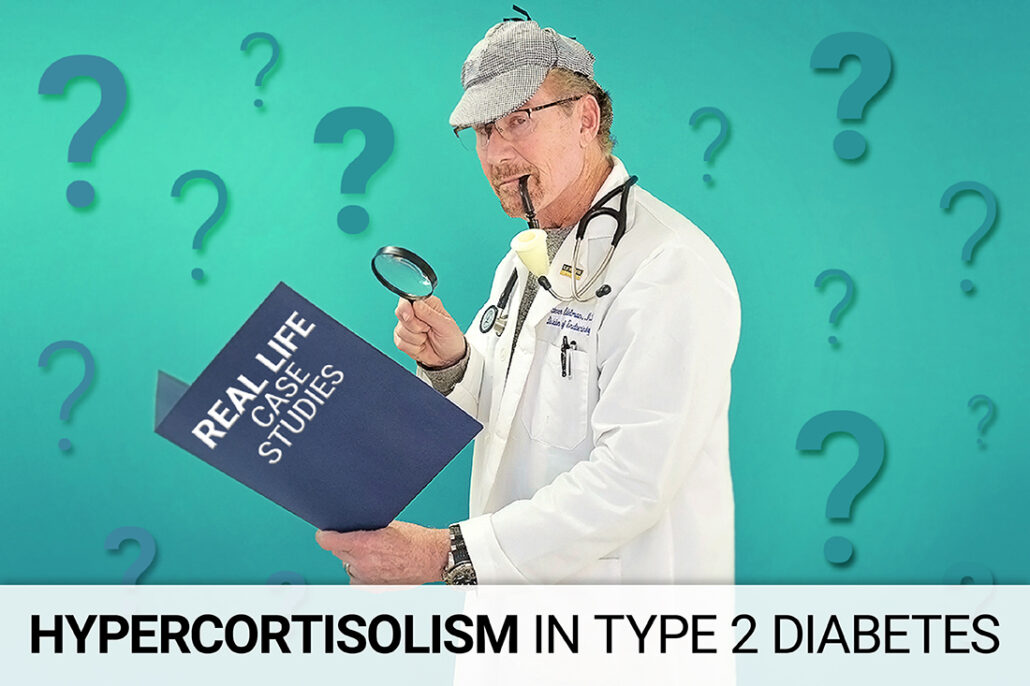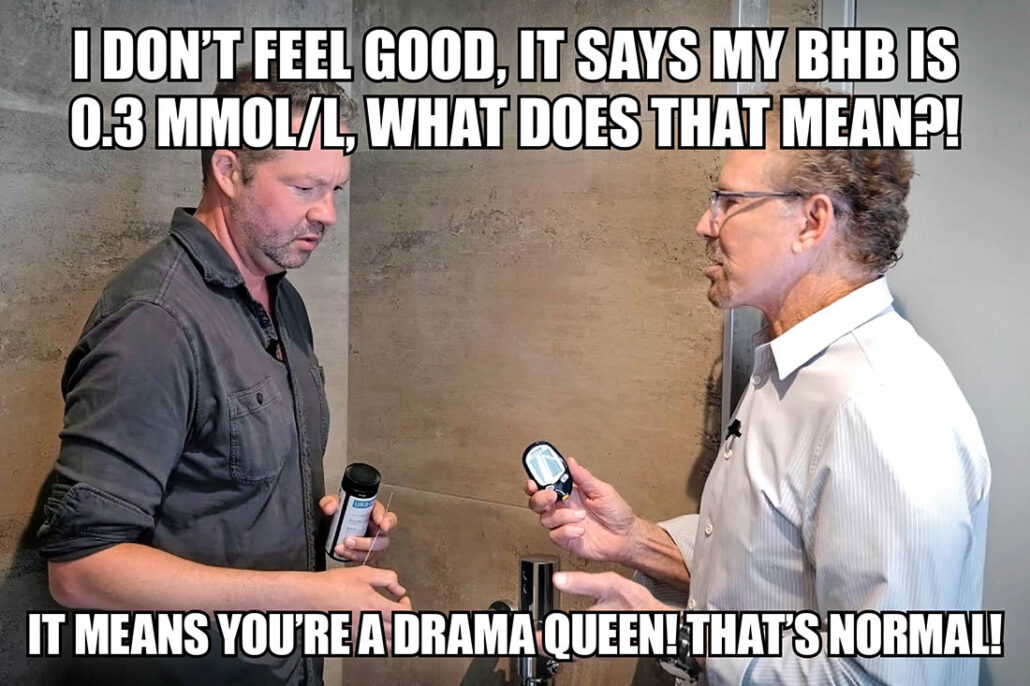Taking All Your Type 2 Meds But Diabetes Still Won't Listen?
Stop Blaming Yourself—Uncover the Role of Cortisol in Hard-to-Control Type 2 Diabetes and What to Do Next
In this video, you will learn about the following:
✔ What hypercortisolism is and how elevated cortisol affects blood sugar control
✔ Why up to 1 in 4 people with difficult-to-treat type 2 diabetes have high cortisol levels
✔ Warning signs including hard to control diabetes despite multiple medications, including GLP1s
✔ The dexamethasone suppression test to diagnose elevated cortisol levels
✔ When and how to advocate with your healthcare provider for to test your cortisol levels
If you’re taking all your diabetes medications and following treatment plans but still struggling to meet your blood sugar goals, hypercortisolism might be the missing piece of your diabetes puzzle. This condition, characterized by elevated cortisol levels from the adrenal glands, affects up to 25% of people with type 2 diabetes and can significantly interfere with how your body responds to diabetes medications. Cortisol, often called the stress hormone, naturally raises blood glucose levels, making it extremely difficult to maintain stable diabetes control even when you’re doing everything right. Understanding this connection is crucial because many people with diabetes spend years feeling frustrated with their management, not realizing that an underlying hormonal imbalance could be blocking their path to success. Learn how to recognize the signs of hypercortisolism and take the important step of discussing this possibility with your healthcare provider.
Explore this topic more!
Doing All the Right Things, but Your Diabetes Is Still Out of Whack…
Hypercortisolism: A Hidden Factor in Type 2 Diabetes Management
Learn what hypercortisolism is, the symptoms of hypercortisolism & how to treat hypercortisolism. Find out more about high cortisol levels & related conditions.
Is Your Diabetes Out of Whack? It Could Be Hypercortisolism!
Cortisol is a stress hormone, and when you have too much of it, it causes hyperglycemia (high blood sugar) that doesn’t respond to typical glucose-lowering medications. Hypercortisolism expert Dr. Dan Einhorn discusses the causes, symptoms, screening tests, and treatment options for this difficult condition.
Have you experienced high cortisol levels? Share your experience in the comments below!
© 2025 Taking Control Of Your Diabetes® | Taking Control Of Your Diabetes® is a 501(c)(3) Nonprofit Charitable Educational Organization, Edutaining the Diabetes Community Since 1995.
**We love sharing the latest and greatest in diabetes education, but we are not your doctors! All of the information on our website, in our videos, on our podcasts, on our social media platforms, and in any other current or future communication method is for the purposes of general education only. Please do not post personal medical information on this platform. Always consult with your medical team for testing, diagnosis, treatment, and medical advice before making any changes to your healthcare. AND if you think you are having a medical emergency, call 911**




can this affect type 1s too? like with the Dawn phenomenon? thank yo
It definitely can affect type 1s, but it’s not like the dawn phenomenon. If you rephrased your question and said, “Is it like the dawn phenomenon 24/7?” then it might be close, but the dawn phenomenon typically lasts for about 3-4 hours in the early morning. But good thinking.
I’d like to see the answer to this also. When my stress levels dramatically increase, my control decreases. Huge swings and constant chasing. And I’m on an CGM with an automated pump. T1 for 44 years
A lot of people have that same exact issue. I will write you a prescription to remove all stress from your life – just send us an email! Obviously that is easier said than done. 🙂
I would think it good impact T1D’s as well – but maybe it’s more pronounced in T2D’s. Stress level have a significant effect on my blood sugar control for sure. T1D 54 yrs.
Hypercortisolism is currently thought to occur primarily in type 2s, but now that it’s more on the radar where it wasn’t so much before, you never know. It might be more common in type 1s than we previously thought. In fact I’m working with someone right now with type 1 who may have it.
I was tested but not with dexamethasone. Probably why my test came back inconclusive 😵💫
For sure. You need to take the dexamethasone because it’s supposed to suppress your endogenous levels and if your levels come back high (even though you’re suppressing it) that determines the diagnosis. So if you didn’t have it, it does make the test inaccurate.
I’m also interested in learning if type 1’s could be subject to this problem. I will celebrate 60 years of my diagnosis this September. My parents were told I wouldn’t live to see 20 years of age due to my brittle diabetes. I am on a pump with a CGM and auto control, yet I’m still brittle. This is an avenue I haven’t heard of or been tested for. Please advise.
First of all, congratulations on 60 years of living with type 1 diabetes (and by the way my doctors told me the same thing when I was diagnosed, so I hear ya). In terms of whether or not you have hypercortisolism, it really depends on other things, such as are you insulin resistant, do you have high blood pressure despite taking several medications, are you overweight and not responding to one of the GLP-1 drugs? I don’t think you have it from what little you’ve told me. Having brittle diabetes isn’t one of the issues, so you need more information. You might want to mention it to your doctor (but don’t tell him or her I suggested you do that!).
I am 47 years diabetic, type 1. I am currently on 5 units of Mounjaro & haven’t lost any weight after 4 months. Could this hypercortalism be why I am not losing weight. My blood works is always good A1c is 6.6, blood pressure is good, thyroid good. Everything checked is within parameters. I really want to lose at least 30lbs, but no luck. What would you suggest??
I was suffering from terrible burping because of Mounjaro, but that has let up, not completely gone, but better.
I don’t think you have hypercortisolism. I do think you’re on too low a dose of Mounjaro. You are on the lowest therapeutic dose. 2.5mg is supposed to be just for starting, so you won’t really know until you go up. Don’t wait four months until your doctor increases you to 7.5mg. After one month, if you don’t have side effects and your weight hasn’t changed, then you have to go up to the next dose.
Hey Steve. I’m the “Cushing Queen” of so California! I’ve got 68 pts with high DSTs. We screen everyone especially those taking 2 or more BP meds. This is a fun and complex disease. Thanks for the video! B
Jeff…YOU ARE THE MAN!! Thanks for sharing, and the rest of the world needs to catch up to you. If this was not on social, you know how I would say goodbye!
I really enjoyed your video. I was taking Korylum for my Hypercortisalism but side effects of uncontrollable itching was to much. Is there anything else out there for to high of cortisol.
Did you get a rash also when you were taking Korlym? If you did, did it go away after you stopped taking it? We have learned that you may not get itching again if you restart Korlym. Even if you did not get a rash, if the itching when away when you stopped the medication, it may not reoccur upon reinitiation. (That information came from an expert in the field.) There are other medications out there (including one from Xeris called Recorlev) that you could try and could potentially help you, but you need to run that by your doctor.
A year ago while seeking any answer to fatigue from long covid, I took a cortisol a.m. test at Quest. The result was 26.0. Is there anything I should be doing?
Jan Fronk 59 years T1D
Well, you obviously need to talk to your own doctor, but to measure cortisol correctly, you take the dexamethasone suppression test, which we spoke about in the video. You take one milligram of dexamethasone at 11pm, then get your cortisol and dexamethasone levels tested in the morning.